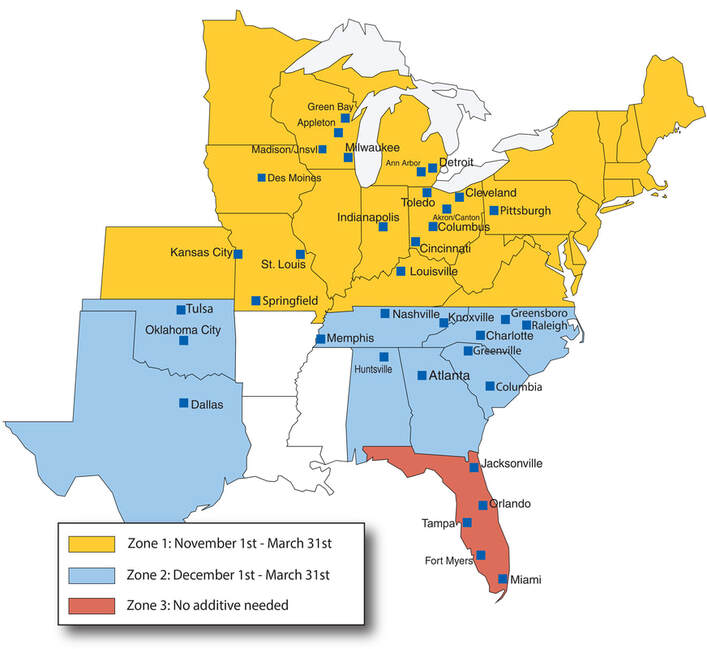Keeping your fleet up and running during cold weather can be challenging. Our seasonally blended fuels can help.
Paraffin wax that is normally suspended in diesel begins to gel when the fuel reaches its cloud point which ranges between -10 degrees and 15 degrees F. Gelling can cause fuel filters to clog and your trucks to shut down.
Jacobus Energy’s Winter Additive Program
November through March
- Our team monitors long range weather forecasts (10 days) so we know when to either increase our additive blend or introduce #1 fuel. Our goal is to begin the increased ratio at least 48 hours before the forecasted low. We maintain the increased ratio as long as needed.
- Blending #1 with #2 diesel lowers your cloud point. #1 diesel has a cloud point ranging from -30 degrees to -40 degrees F.
- Our bulk tanks are tested regularly throughout the season.
Testing
- Test samples are taken from our delivery trucks every week between November 1st and March 31st. In markets with multiple trucks, the truck tested is changed each time.
- Our samples are tested by a third party provider.
- We have them test for these items:
- Cloud Point (the temperature that wax begins to crystallize)
- CFPP (Cold Filter Plug Point) (the laboratory testing temperature where a filter begins to plug)
- Water content (Karl Fischer KF moisture content in parts per million)
- We compile and analyze the test data and adjust treatments as needed.

Tips to keep your fleet running during winter:
-
- Replace fuel filters at manufacturer recommended intervals. Particles in the filter make it easier for wax to gel. Use the highest OEM accepted micron filter possible.
- Keep your fuel tanks full and free of water. Cold air on top of warm fuel creates condensation. This can be reduced by limiting the amount of space in your tanks.
- Test any bulk tanks for water.Water freezes faster than the wax in the fuel. If your fuel has 100 ppm or higher water content, it should be treated with a drying agent.
- Drain fuel water separators and be sure to monitor them even between scheduled maintenance.
- If your vehicle is going to be idle for long periods of time (4 hours or more) you may want to install a fuel heater or find heated parking. Moving liquid takes longer to freeze than stationary liquids. Keep your fuel moving or keep it warm.
- After your vehicle has been off the road for an extended period, start and let the engine idle for 30 or more minutes allowing warm fuel to return to the fuel tanks to break up any wax buildup.
- Jacobus Energy has a comprehensive Winter Additive Program. Using another fuel provider may not provide the same level of protection.
DEF (Diesel Exhaust Fluid) and cold weather:
-
-
- DEF is required to remain pure to operate correctly. Additives should never be added to DEF.
- DEF freezes at 12 degrees F. The 32.5% urea concentration in DEF allows both the urea and water to thaw at the same rate, therefore keeping the solution from being diluted or over concentrated.
- SCR systems are designed to provide heating to the supply tanks and lines during normal operation. If the DEF freezes when the vehicle is idle, normal start-up and operation will not be inhibited. The DEF will thaw as the vehicle is operated. Freezing and thawing will not degrade the product.
-


